First professional Internet media conference (i-media 2007) ended in Moscow
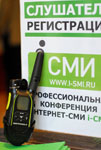 October 16, 2007 in Moscow Conference Center EXTROPOLIS was held
October 16, 2007 in Moscow Conference Center EXTROPOLIS was heldThe first professional conference of Russian Internet media: i-media 2007.
The event was organized by the Regional Public Center for Internet Technologies (ROCIT) and the All-Russian Media Workers Organization MediaSoyuz. The event was supported by the Federal Agency for Press and Mass Communications.
The conference organizers chose the most democratic format for it and were not mistaken: as a result, the participants of i-media 2007 came to the unanimous opinion: the conference was a success, the format was pleasant.
The main theme of i-media 2007 was content .
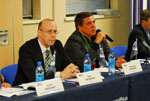 The conference was opened by Mark Tverdinin , Chairman of the Board of ROCIT. According to the speech of the President of the All-Russian Media Workers Organization “Media Union” Alexander Lyubimov , who spoke at the opening of the conference, it is the content on the Web that should become more qualitative and honest. At the opening , Yuri AKINSHIN , Deputy Head of the Broadcasting and Mass Media Department of the Federal Agency for Press and Mass Communications, reminded everyone present of the birth of a new phenomenon - mass media (SMK), which include today’s blogs, social networks, professional Internet - community. According to him, today the information has superfluidity, in addition, it has become more transparent - this is an evolutionary process, which is not particularly dependent on the will of specific public servants. According to the representative of Rospechat, media convergence is gaining more and more power - there are about 500 convergent editions in the world today.
The conference was opened by Mark Tverdinin , Chairman of the Board of ROCIT. According to the speech of the President of the All-Russian Media Workers Organization “Media Union” Alexander Lyubimov , who spoke at the opening of the conference, it is the content on the Web that should become more qualitative and honest. At the opening , Yuri AKINSHIN , Deputy Head of the Broadcasting and Mass Media Department of the Federal Agency for Press and Mass Communications, reminded everyone present of the birth of a new phenomenon - mass media (SMK), which include today’s blogs, social networks, professional Internet - community. According to him, today the information has superfluidity, in addition, it has become more transparent - this is an evolutionary process, which is not particularly dependent on the will of specific public servants. According to the representative of Rospechat, media convergence is gaining more and more power - there are about 500 convergent editions in the world today. Note that it was the sections on media convergence and the development of Web 2.0 (moderator Lech ANDREYEV , Vebplaneta) that were most popular at the conference. Some speakers compared traditional media with mammoths and predicted evolutionary extinction.
Note that it was the sections on media convergence and the development of Web 2.0 (moderator Lech ANDREYEV , Vebplaneta) that were most popular at the conference. Some speakers compared traditional media with mammoths and predicted evolutionary extinction.So, in the “Web 2.0” section , Oleg KOZYREV , editor of the NewTimes.ru portal and the project BlogsNews.ru, whose report was called “Mammoths are always dying out,” spoke about the indisputable benefits of blogs and outdated traditional television work methods. According to him, bloggers are owners of more operational content, while ratings of news programs on television that do not have the necessary responsiveness are rapidly falling. The expert believes that in the near future, thanks to the Web 2.0 technology, everyone can create their own TV channel, filling it with their own content.
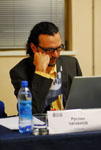 Ruslan CHACHANOV (Liveinternet) also spoke about the efficiency of bloggers and the reliability of the information they publish. The blogger is not only many times ahead of the traditional media in the efficiency of publishing relevant material, often at the scene of the event, but also in the accuracy of the published news, Ruslan believes. The echo from the published materials, according to a Liveinternet representative, is much longer than from information published in the media.
Ruslan CHACHANOV (Liveinternet) also spoke about the efficiency of bloggers and the reliability of the information they publish. The blogger is not only many times ahead of the traditional media in the efficiency of publishing relevant material, often at the scene of the event, but also in the accuracy of the published news, Ruslan believes. The echo from the published materials, according to a Liveinternet representative, is much longer than from information published in the media.Marina Shilina (MSU) spoke a lot about the trend of “personalization” (active involvement of the individual in the process), which is gaining momentum. In her opinion, today, whether the media wants it or not, the users themselves control the content. And by 2010, according to IDC, about 70 percent of Internet users will become content authors.
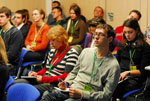 Participants of the section of the same name spoke for a long time about the introduction of media convergence into the editorial policy: Natalia LOSEVA (RIA Novosti), Igor TIKHIY (PRIME-TASS), Alexander LEONTIEV (Izvestia.ru), Sergey EROFEEV (IATR), Wanda KILOSCHAYEVA (Bemobi.ru ). Experts agreed that today the Russian editions are significantly lagging behind the Western ones in terms of the editorial convergence. They also talked a lot about the need to educate the so-called cyberjournalist, a universal soldier who had already firmly settled down in the West. Such soldiers should be able to perform several jobs: shoot for the camera, take pictures and write material.
Participants of the section of the same name spoke for a long time about the introduction of media convergence into the editorial policy: Natalia LOSEVA (RIA Novosti), Igor TIKHIY (PRIME-TASS), Alexander LEONTIEV (Izvestia.ru), Sergey EROFEEV (IATR), Wanda KILOSCHAYEVA (Bemobi.ru ). Experts agreed that today the Russian editions are significantly lagging behind the Western ones in terms of the editorial convergence. They also talked a lot about the need to educate the so-called cyberjournalist, a universal soldier who had already firmly settled down in the West. Such soldiers should be able to perform several jobs: shoot for the camera, take pictures and write material.How to earn an edition on your content is the main question that members of the Monetization of Content section organized by Begun tried to answer. Dmitry GLAVATSKY (Runner) gave some advice to the audience on the correct and effective placement of contextual advertising. Kirill GOTOVTSEV (Maniaco) spoke about the correct, in his opinion, scheme of building relationships between the media and the advertising agency, and Alexander LEONTIEV (Izvestia.ru) stopped the attention of listeners on how the editorial board can earn money in conditions of fierce competition in the mass market. media
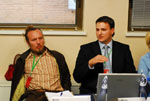 The fourth part of the Civil Code of the Russian Federation, which, we recall, will come into force on January 1, 2008, was again discussed at the round table "Questions of state regulation of online media" . The Round Table was held by Ivan Zasursky (MSU) and Vladimir GORZHALTSAN (RAEC). The Round Table participants came to the conclusion that our legislation is not yet fully adapted to the developing Internet: the regulation presented in the fourth part of the GKRF is typical for the late 80s and early 90s. Oleg RYKOV , the former adviser to the Government Office of the Russian Federation, identified the most acute problems of the legal regulation of online media at the moment - these are media activities; intellectual right; distribution of knowingly incorrect information; turnover of counterfeit or falsified products.
The fourth part of the Civil Code of the Russian Federation, which, we recall, will come into force on January 1, 2008, was again discussed at the round table "Questions of state regulation of online media" . The Round Table was held by Ivan Zasursky (MSU) and Vladimir GORZHALTSAN (RAEC). The Round Table participants came to the conclusion that our legislation is not yet fully adapted to the developing Internet: the regulation presented in the fourth part of the GKRF is typical for the late 80s and early 90s. Oleg RYKOV , the former adviser to the Government Office of the Russian Federation, identified the most acute problems of the legal regulation of online media at the moment - these are media activities; intellectual right; distribution of knowingly incorrect information; turnover of counterfeit or falsified products.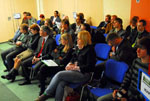 A logical continuation of the issues of state regulation of Runet was the round table “ Legal issues of online media work ”, which was conducted by Anton SERGO (Internet and law), and which was attended by Vasily TERLETSKY (Kopyrus), Vladimir GORZHALTSAN (RAEC), Andrey VOROBYEV (RU -CENTER), Sofia GRUNYUSHKINA (MEPI) and Urvan PARFENTIEV (your personal Internet). The same interest among the participants of the round table was caused by the topic of copyright, legal issues related to domain names, the new edition of Part IV of the Civil Code, etc.
A logical continuation of the issues of state regulation of Runet was the round table “ Legal issues of online media work ”, which was conducted by Anton SERGO (Internet and law), and which was attended by Vasily TERLETSKY (Kopyrus), Vladimir GORZHALTSAN (RAEC), Andrey VOROBYEV (RU -CENTER), Sofia GRUNYUSHKINA (MEPI) and Urvan PARFENTIEV (your personal Internet). The same interest among the participants of the round table was caused by the topic of copyright, legal issues related to domain names, the new edition of Part IV of the Civil Code, etc.Within the “Personnel” section organized by Lenta.ru, there was a lack of specialists in online media. Dmitry MALIN (“RDV Media”) gave disappointing results of the analysis of supply and demand based on statistics from the Jobs.ru website. The ratio of vacancies / resumes in online media looks extremely depressing, and the salary expectations of applicants are much higher than those that an employer can offer. The main trend in the labor market for online media, in his opinion, is a large number of unqualified personnel. To combat this, Dmitry proposes this way: to hire a person “for growth” with another specialty or to take a specialist from another industry.
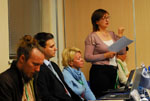 Natalia SELEZNEVA (MediaJOBS.ru) reported that today, in the area of shortage of human resources for online media, there are managerial competencies, the “history” of the Internet as a business, business culture and responsibility, general education and professional education for middle managers of Internet specialists, as well as low wages as a leaving factor for other deficiencies. Ivan Zasursky (Moscow State University) reassured the section participants, saying that starting in 2007, the Moscow State University will change the teaching model - special skills for future journalists will be included in the programs of the first and second courses, since the most valuable journalists for online media, according to Ivan Zasursky - These are journalists with convergent skills that can not only write, but also record sound, shoot video.
Natalia SELEZNEVA (MediaJOBS.ru) reported that today, in the area of shortage of human resources for online media, there are managerial competencies, the “history” of the Internet as a business, business culture and responsibility, general education and professional education for middle managers of Internet specialists, as well as low wages as a leaving factor for other deficiencies. Ivan Zasursky (Moscow State University) reassured the section participants, saying that starting in 2007, the Moscow State University will change the teaching model - special skills for future journalists will be included in the programs of the first and second courses, since the most valuable journalists for online media, according to Ivan Zasursky - These are journalists with convergent skills that can not only write, but also record sound, shoot video.Also in the course of the section were: Yulia SANDLER (IA REGNUM) with the report “Principles of building the regional editorial board”, Yury SINODOV (Roem.ru) with the report “How to turn a freelancer into a journalist” and Natalya KUTUSHEVA , who told about the creation of her own Internet advertising service -MASS MEDIA.
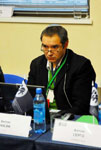 The round table “Censorship” and “Self Censorship” in the Runet ” , which was conducted by Anton NOSIK (SOUP Fabrik) and Alexey RAMENSKY (ROCIT), began with a detailed report by Urvan PARFENTIEV (your personal Internet) called“ Interactive Internet Media Services - the Lure for state regulators? .. ". According to the expert, the problem of "censorship" on the Internet currently concerns private circulation of information (forums, blogs, private sites), and not content. Moderation is not typical for forums and blogs when editing, as the media is interested in live feedback. Hence the problems - inadmissible phenomena and facts in journalistic work. Urvan PARFENTIEV gave several recommendations for the protection of online media, including: putting interactive services outside the site; fast post-moderation; protection of personal user data. Roundtable participants talked a lot about content at risk and the position of the hosting provider whose client has conflicting properties. Also during the Round Table a new website www.censorship.ru , an encyclopedia of censorship and conflict in RuNet, was presented to the participants.
The round table “Censorship” and “Self Censorship” in the Runet ” , which was conducted by Anton NOSIK (SOUP Fabrik) and Alexey RAMENSKY (ROCIT), began with a detailed report by Urvan PARFENTIEV (your personal Internet) called“ Interactive Internet Media Services - the Lure for state regulators? .. ". According to the expert, the problem of "censorship" on the Internet currently concerns private circulation of information (forums, blogs, private sites), and not content. Moderation is not typical for forums and blogs when editing, as the media is interested in live feedback. Hence the problems - inadmissible phenomena and facts in journalistic work. Urvan PARFENTIEV gave several recommendations for the protection of online media, including: putting interactive services outside the site; fast post-moderation; protection of personal user data. Roundtable participants talked a lot about content at risk and the position of the hosting provider whose client has conflicting properties. Also during the Round Table a new website www.censorship.ru , an encyclopedia of censorship and conflict in RuNet, was presented to the participants.The most popular sections were: “ How to attract the right audience ” (organized by Subscribe.ru) and the section “ Technologies for the media ”. ROCIT has traditionally successfully covered these topics at its events, for example, at the Russian Internet Forum (RIF).
 In the course of the section “ Technologies for the Media ”, which Lech Andreev (Webplanet) conducted, various technologies were discussed, without which the work of Internet media today is unthinkable: from approaches to audience measurement (report by Sergey DAVYDOV , GfK-Rus) to systems content management and the most frequently encountered issues in connection with the technical and content administration of Internet-media (report by Sergey RYZHIKOV , “1C-Bitrix”).
In the course of the section “ Technologies for the Media ”, which Lech Andreev (Webplanet) conducted, various technologies were discussed, without which the work of Internet media today is unthinkable: from approaches to audience measurement (report by Sergey DAVYDOV , GfK-Rus) to systems content management and the most frequently encountered issues in connection with the technical and content administration of Internet-media (report by Sergey RYZHIKOV , “1C-Bitrix”).The section did not go without a scientific component: Sergey Plugotarenko (ROCIT) told about the first results of the research "Development of methods for analyzing and monitoring Internet media and Internet QMS", on which ROCIT works together with representatives of the Faculty of Journalism of Moscow State University, GfK-Rus , “Finam” and a number of leading experts in the field of sociology and Internet technologies. The methodology was developed throughout 2007 and will be published for further refinement and discussion in early November. In the method itself, there are still a lot of “white spots” and in order to get rid of them, ROCIT called on all interested experts for help.
In total, more than 300 people took part in the 9 round tables and sections of the conference, and more than 50 presentations and presentations were given. Work was carried out in 3 streams.

The work of the participants was facilitated by a large number of coffee breaks and one express lunch, while the venue itself - the EXTROPOLIS conference center - was generally considered very convenient and suitable for holding such conferences.
In general, we can safely say that the i-media conference 2007 is a new format of professional events proposed by ROCIT, in which it was possible to unite competitors and give everyone the opportunity to share experiences with colleagues and gain new knowledge in the field of electronic media. And what is important - i-media 2007 provided everyone with a great opportunity to meet in real life with colleagues, with whom they often have to communicate virtually.
We thank all the conference participants for their lively interest and lively questions, and often applause for the speakers!
')
Source: https://habr.com/ru/post/15172/
All Articles